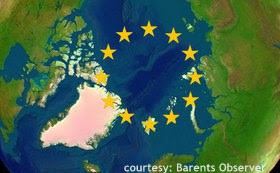by Kathrin Keil A number of opportunities for the European Union to get involved in Arctic affairs exist, one of them being a strengthened energy-partnership with Norway. The EU has indeed put a focus on the Arctic’s energy potential. As the 2008 Communication from the Commission to the European Parliament and the Council reads: “Arctic resources could contribute to enhancing the EU’s security of supply concerning energy and raw materials in general.” However, when reading the official EU documents on the Arctic (there have not been many: the previously mentioned Commission Communication in 2008, a Parliament resolution in 2009, a Report in 2010, and Council Conclusions on Arctic issues in 2009), it becomes clear that the EU has overall remained pretty general and vague about its envisioned EU Arctic Policy.
In particular the general nature of these documents depicts a harmony that is not realistic. The papers fail to expand upon potentially contradicting policy issues that the EU faces in its current, premature Arctic policy approach. The most apparent contradiction comes to light when considering the two policy-areas the EU emphasizes the most when presenting its interests and ambitions in the region: energy security – mainly understood in terms of security of supply – and climate change.
First, it is important to note that these issue areas are highly interconnected. The reliance on fossil fuels for energy generation contributes to the changing climate and is responsible for most of today's and future GHG emissions. The effects of climate chance will be felt first and foremost in the Arctic region where temperatures are slated to increase at twice the rate of lower latitudes. The EU's decision to reduce greenhouse gas emissions by 20%, increase the share of renewable energy to 20%, and improve energy efficiency by 20% , represents the first steps to limiting future GHG emissions [1].
The EU’s goals in the Arctic when compared to the EU's climate change agenda clearly illustrates the Union's contradictory policy approaches. Energy security for the EU must be understood in terms of security of supply. In order to address growing energy scarcity and dependence the EU aims to find new and diversified energy sources. The Arctic holds significant amounts of conventional energy resources – mainly oil and natural gas. The increasing reliance on hydrocarbon resources in the Arctic contradicts the goals of the EU’s climate change policy to achieve reduction of GHG emissions and rapid growth of the renewable energy sector. These divergent approaches may lead to questions about the region's leadership role in the fight against climate change. The Swedish government in its evaluation of the Commission’s Communication points out this contradiction.
The EU's continued financial support of Carbon Capture and Storage (CCS) may also weaken the EU's support of and focus on spurring investments in renewable energies and promotion research on alternative low-emission energy production.
Additionally, the exploitation of Arctic resources is very energy intensive – running counter to the EU’s goals to improve energy efficiency – and could potentially damage the local environment and contribute to GHG emissions.
The EU's goal to profit from newly discovered energy resources in the High North, which are predominantly expected in the Russian part of the Arctic, runs counter the current ambition of many EU member states seeking to reduce their energy dependence on Russia. An increased energy partnership with Norway and its Arctic hydrocarbon resources could help the EU to diversify its supply away from Russia. However, the EU cannot ignore Russia as the most important Arctic hydrocarbon actor, given that the Russian shelf holds more than half the expected oil and gas reserves in the Arctic.
The EU can certainly become a important actor and partner in Arctic issues, but the Union must more clearly define its preferences and values when entering a new regional policy field. In short, policy-makers in Brussels have to ensure that the prospective EU Arctic Policy does not contain contradictory policy preferences, with regard to climate change and energy security, but rather follows a coherent set of goals and values directed at the Arctic’s possibilities and challenges.
sources:
[1] Communication from the Commission to the European Council and the European Parliament - an energy policy for Europe {SEC(2007) 12}, http://eur-lex.europa.eu/LexUriServ/LexUriServ.do?uri=COM:2007:0001:FIN:EN:PDF).


